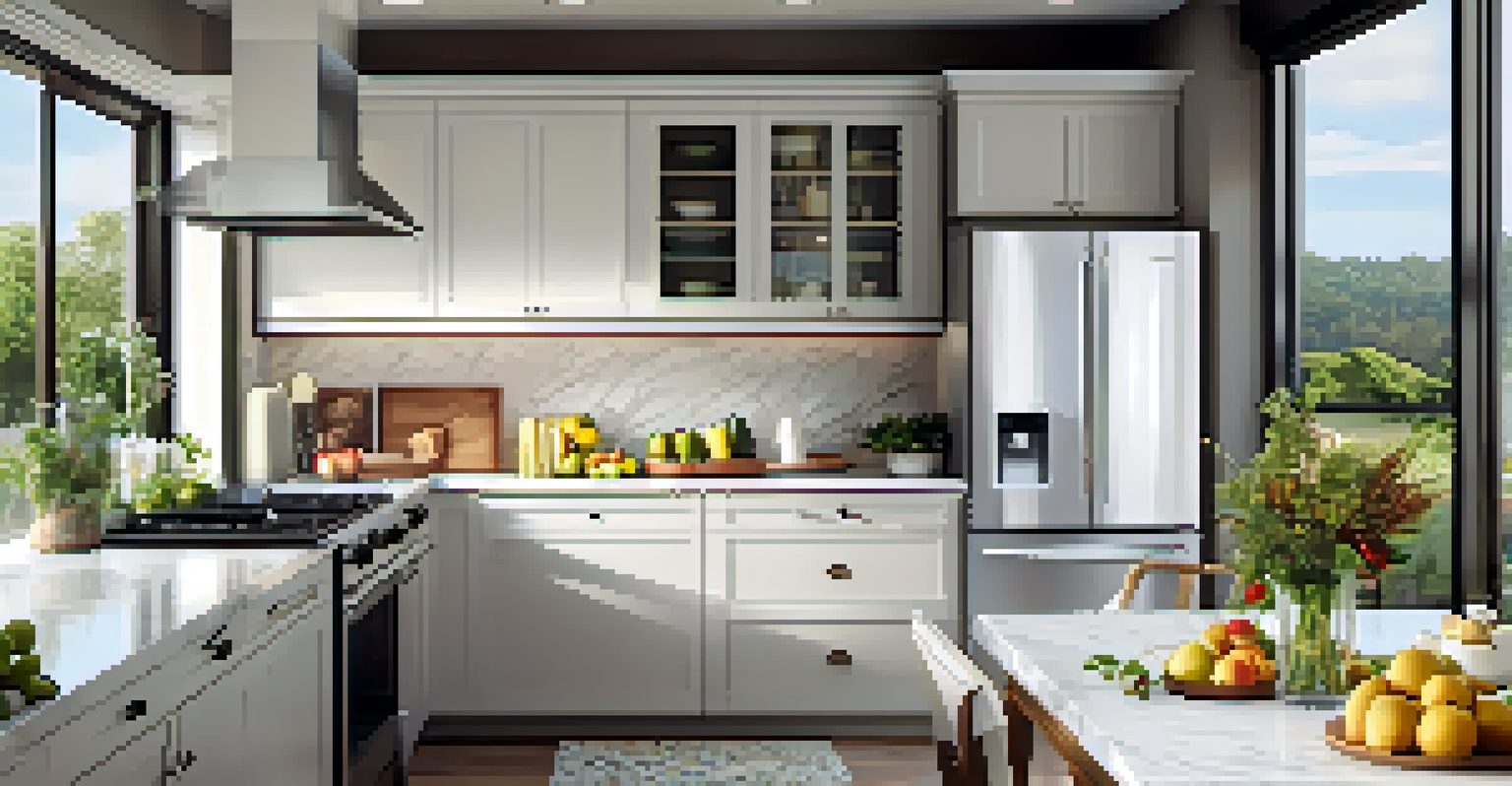Smart Home Upgrades for Energy Efficiency and Savings

Understanding Energy Efficiency in Smart Homes
Energy efficiency in smart homes refers to using technology to reduce energy consumption while maintaining comfort. This can be achieved through smart devices that automate and optimize energy usage, leading to significant savings on utility bills. For instance, smart thermostats learn your schedule and adjust heating and cooling accordingly, ensuring energy isn't wasted when you’re not home.
Energy efficiency is not just about using less energy; it's about using energy wisely.
By integrating smart home technology, you're not just investing in convenience; you're also contributing to a more sustainable future. This concept is all about making smarter choices for both your wallet and the environment. Imagine reducing your carbon footprint while enjoying a cozy living space—it's a win-win!
Ultimately, embracing energy efficiency through smart upgrades can empower you to take control of your energy usage. As you become more aware of how energy flows in your home, you'll find opportunities to save money while also promoting a greener lifestyle.
Smart Thermostats: A Game Changer for Savings
Smart thermostats are among the most popular energy-efficient upgrades homeowners make. Devices like the Nest or Ecobee learn your heating and cooling preferences, allowing them to adjust settings automatically. This means your home is always at the perfect temperature without the need for constant manual adjustments.

Not only do smart thermostats save energy by optimizing your HVAC system's performance, but they also offer remote control features. You can adjust your home's temperature from your smartphone, ensuring you're not heating or cooling an empty house. This flexibility can lead to substantial savings on your energy bills, especially during extreme weather conditions.
Smart Devices Enhance Energy Savings
Integrating smart technology in homes significantly reduces energy consumption while improving comfort and convenience.
Additionally, many smart thermostats provide detailed energy reports, helping you understand your usage patterns. This insight can motivate you to make further adjustments, such as changing your habits or investing in additional energy-saving devices.
Energy-Efficient Smart Lighting Solutions
Switching to smart lighting is another effective way to enhance energy efficiency at home. Smart bulbs, like those from Philips Hue, allow you to control your lighting via an app or voice commands, making it easy to turn off lights when you leave a room. This simple change can lead to significant energy savings over time.
The future is green energy, sustainability, renewable energy.
Moreover, many smart lighting systems offer features like scheduling and dimming. You can set your lights to turn off automatically when it’s time for bed or adjust brightness based on the time of day. Such customization not only saves energy but also enhances the ambiance of your home.
The added benefit of smart lighting is that it can be integrated with other smart home devices. For example, connecting your lights to a smart home hub means they can react to your daily routines, further optimizing energy usage throughout the day.
Smart Plugs: Control Energy Use with Ease
Smart plugs are an easy and affordable way to begin your journey toward energy efficiency. These devices allow you to control anything plugged into them through your smartphone, giving you the ability to turn off appliances remotely. This can be particularly useful for devices that often get left on accidentally, such as coffee makers or chargers.
Some smart plugs even come with energy monitoring features that track how much energy each device uses. This information can help you identify energy hogs in your home and encourage you to switch to more efficient alternatives. It's a proactive approach to managing your energy consumption.
Smart Thermostats Optimize Comfort
Smart thermostats automatically adjust heating and cooling based on your preferences, leading to substantial savings on energy bills.
Additionally, smart plugs can be programmed to operate on a schedule, which means you can set your devices to turn on or off at specific times. This not only conserves energy but can also provide added convenience in your daily routine.
Smart Appliances: Efficiency Meets Innovation
Investing in smart appliances is a significant step towards enhancing energy efficiency in your home. From refrigerators that monitor food freshness to washing machines that optimize water use, these appliances are designed to save energy while providing excellent performance. They often come with features that allow you to control them remotely, making your life more convenient.
Smart appliances are also designed to be more energy-efficient than their traditional counterparts. Many of them are rated with Energy Star certifications, ensuring they meet strict energy efficiency guidelines. This means you can enjoy modern conveniences while also reducing your overall energy consumption and costs.
Furthermore, some smart appliances can communicate with other devices in your home. For example, a smart dishwasher can pause its cycle if your smart meter indicates high energy usage, shifting its operation to a more favorable time. This level of integration can lead to even greater savings on your utility bills.
Home Energy Management Systems for Optimal Control
A home energy management system (HEMS) is an advanced option for those looking to maximize their energy efficiency. These systems provide real-time monitoring of your entire home’s energy consumption, allowing you to identify trends and make informed decisions. With this knowledge, you can adjust your usage to avoid peak energy rates and save money.
Many HEMS can integrate with smart devices, providing a centralized platform to control everything from lighting to heating. This comprehensive oversight means you can optimize your home's energy use with a few taps on your smartphone. Imagine being able to see which devices are using the most energy and adjusting them accordingly, all in one place.
Solar Panels Offer Long-Term Savings
Investing in solar panels can dramatically lower utility costs and contribute to a sustainable energy future.
Moreover, some systems offer predictive analytics, suggesting ways to save based on your historical energy usage. This proactive approach not only helps you save money but also empowers you to make sustainable choices for your household.
Solar Panels: A Long-Term Investment in Efficiency
While the initial investment may seem daunting, solar panels are one of the most effective upgrades for long-term energy savings. By harnessing the power of the sun, you can significantly reduce your reliance on grid electricity. This not only lowers your utility bills but also contributes to a more sustainable energy future.
Many homeowners find that solar panels pay for themselves over time through energy savings and tax incentives. Additionally, with advancements in technology, solar panels have become more efficient and affordable, making them accessible to a wider audience. It’s a smart financial decision that benefits both your wallet and the planet.

Furthermore, integrating solar panels with a battery storage system allows you to store excess energy for later use. This means you can power your home even during outages or at night, maximizing your energy independence and resilience.
Embracing the Future: Your Smart Home Journey
Embarking on a journey toward a more energy-efficient smart home may seem overwhelming, but it doesn't have to be. Start small by integrating a few smart devices, such as a thermostat or smart plugs, and gradually expand your collection as you see the benefits. Each upgrade not only saves energy but also enhances your comfort and convenience.
As you incorporate more smart technologies, you'll find that they often work together seamlessly, creating a cohesive system that optimizes your home’s energy use. This interconnectedness is what truly elevates a smart home experience, making it easier to manage and control your energy consumption.
Ultimately, the goal is to create a home that is not just efficient, but also responsive to your lifestyle. Embrace these smart home upgrades and enjoy the financial savings, increased comfort, and positive environmental impact they bring to your everyday life.